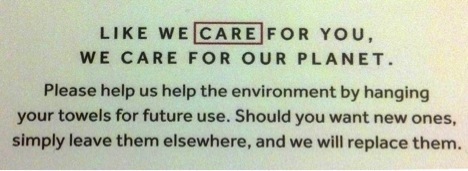“Do your homework,” a parent might say to a child, “or you won’t get into Harvard.” A typical response might be, “ Like I care.”
That expression of sarcasm, snark, disdain, what-have-you is firmly embedded in American slang. “You are telling me this news like it matters to me,” is the definition of “like I care” in The American Slang Dictionary.
A hotel bathroom is not a usual place to find sarcasm, yet this was how one hotel made the ubiquitous request for guests to reuse towels:

For many, that usage is like the sound of nails on blackboard.
To start with, the expression “Like we care for you” sets up a reader (or hotel guest) to think that the hotel is being snarky: “Yeah, like we care for you.” When the reader gets to “we care for our planet,” she probably has to back up and revisit the beginning of the sentence. That was likely unintentional, especially when the message is simply to ask the guest to reuse towels. In this case, “like” was supposed to be shorthand for “In much the same way as we care for you, we care for the planet.”
The wording could have been adjusted slightly to make the message clearer: “The same way we care for you, we care for our planet” would be colloquial enough that any grammatical shortcomings would raise far fewer hackles. It might even fit the space on the card. But to leave it the way it is invites ridicule (and applications from out-of-work copy editors).
A similar slang expression to “like I care” is “as if I care” (defined in the American Slang Dictionary as “What has led you to believe that I care at all?”). And that’s a clue to the grammatical problem with the sentence.
“Like” has many roles: It can be a noun (especially on Facebook), a verb, an adverb, a preposition, and, many people believe, a conjunction.
In this case, it could be acting as a preposition, similar to “as if,” used in a comparison of two things (the caring for “you” and for “our planet”). The usual test of whether something is a preposition is to replace it with another preposition, like “for,” and see if it still makes sense, kinda. (“For we care about you …” Makes sense, kinda.)
Or maybe “like” was being a conjunction, connecting two clauses, each of which has a verb. Let’s disregard the controversy over whether “like” can do that (most people think it can, and the slang dictionary certainly uses it that way), and test whether “like” can be replaced with another conjunction: “And we care for you, we care for the planet” makes less sense, even if you believe “like” can be a conjunction.
The bottom line is that it doesn’t matter what the grammatical problem is with the request. It’s awkward. So just reuse the towels, or not. In reality, the housekeepers usually change them anyway.
Merrill Perlman managed copy desks across the newsroom at the New York Times, where she worked for twenty-five years. Follow her on Twitter at @meperl.
